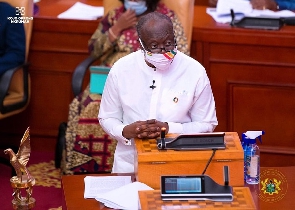The Government of Ghana on Wednesday announced that it has invested in excess of GH¢15.7 billion on key flagship programmes.
According to Finance and Economic Planning Minister Mr Ken Ofori-Atta, “these flagship programmes have created the platform for real economic transformation; strengthening human capital through enhancing access to health care, education and skills development, modernizing agriculture and industry, delivering infrastructure across the country – including a revitalised railway sub-sector – and creating jobs.”
Presenting expenditure on Appropriation for January 1, 2020, to March 31 to Parliament in Accra, the Minister said the Government of Ghana had remained faithful with its budgets- Asempa in 2017, Edwuma in 2018, Mpuntuo in 2019 and the prescient Nkosuo and Nkabom Budget of Covid 19 2020.
Additionally, Government, he said, had also lowered the rate of debt accumulation, re-profiled the nation’s debt and implemented a number of structural reforms in a transparent manner for an efficient and effective management of public debt.
“Mr. Speaker, these significant macro-fiscal gains were achieved in spite of having paid GH¢12 billion in excess energy capacity charges which we inherited in 2017, and have kept the lights on; settled substantial part of the GH¢11 billion outstanding arrears bequeathed to us; and abolished 17 unproductive taxes to boost productivity of the private sector,” the Minister said.
According to the Minister, the Government of Ghana spent GH¢21.6 billion to clean-up a collapsing financial sector and protected 4.6 million depositors and 81,700 investors.
“That is the competent governance, hard work and God’s hand that has delivered us, “Mr Ofori Atta said, adding that “economic indicators are clear evidence of the sharp and stark difference between a competent Akufo-Addo-led Government and others.”
He however said “these gains have not been at the expense of our promise to improve the welfare of fellow Ghanaians, adding that, “the issue of welfare is very dear to President Akufo-Addo and his government.”
He pointed out the restoration of Nurses and Teachers Training Allowances and implementation of the Free SHS programme had empowered current and future generations and eased the financial burden on households.
The Minister said the Government of Ghana was supporting 100,000 graduates through NABCO, and had lowered the net tax burden of the Ghanaian. “That is the care we promised Ghanaians!” he said.
The Minister said the Government of Ghana had pursued prudent macro-fiscal policies and the resultant turnaround of the economy, amidst unprecedented welfare-oriented interventions.
These, he said, been fully tested by the outbreak of the COVID-19 pandemic since March, 2020, and “this pandemic continues to devastate countries, disrupt productivity, threaten food security, multiply job losses, and reduce incomes, particularly for the poorest, as well as traumatic loss of lives.
Also, “this year, the world is on course to experiencing the deepest global economic contraction in the post-war era, causing investments and trade to plunge.
“However, despite health and economic consequences of the pandemic which threatens lives and livelihoods, by God’s Grace, COVID-19 has so far not been as deadly due to our President’s leadership.”
The Minister said Government’s preoccupation had been on addressing the socio-economic, dislocations occasioned by the pandemic, and had “moved swiftly to mitigate the threats to lives and livelihoods by implementing the GH¢1,342 million Covid-19 Emergency Preparedness and Response Plan to protect lives; operationalising the GH¢1.2 Billion Coronavirus Alleviation Programme (CAP) to support businesses;
“launching a GH¢2 billion Guarantee Scheme to enable SMEs borrow at a more affordable rate and supporting the GH¢3 billion credit and stimulus package by commercial banks in Ghana to revitalize industries, especially pharmaceutical, hospitality, services and manufacturing sectors;
“The Government has also offered strategic support in income increases and life insurance in excess of GH¢320 million to incentivize health workers and allied professionals and supporting households and businesses with electricity and water subsidies in excess of GH¢1.3 billion; and funding the provision of cooked food to 1.83 million and 917,000 vulnerable persons within Accra & Kumasi metropolis, respectively,” he said.
Business News of Wednesday, 28 October 2020
Source: GNA

















